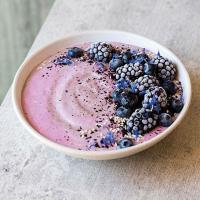
The ways to consume grapes are endless - from red, green and purple grapes to seedless grapes, grape jelly, grape jam and grape juice. And don't forget wine and raisins!
This popular fruit's history goes back as far as 8,000 years, when grape vines were first cultivated in what is now the Middle East.
It may surprise you to hear that the humble grape is actually considered to be a berry. Seventy-two million tons of these berries are grown each year worldwide, with most of them being used to produce wine - 7.2 trillion gallons of wine per year, to be exact.7
The portability, texture, flavor and variety of grapes have made them a popular finger food in countries all over the world. The potential health benefits of consuming grapes are numerous, with past studies associating them with prevention of cancer, heart disease, high blood pressure and constipation.
Possible health benefits of grapes
Consuming fruits and vegetables of all kinds has long been associated with a reduced risk of heart disease, diabetes, cancer and other conditions.
Many studies have shown that increasing consumption of plant foods like grapes decreases the risk of obesity and overall mortality.
Grapes also have some special components that make them even more essential to our health, giving them "super food" status. Although more research is needed before any of these health benefits can be said to be conclusive, grapes have been associated with reducing the risk of the following conditions:
1) Cancer
Grapes contain powerful antioxidants known as polyphenols, which may slow or prevent many types of cancer, including esophageal, lung, mouth, pharynx, endometrial, pancreatic, prostate and colon.1
The resveratrol found in red wine famous for heart health is a type of polyphenol found in the skins of red grapes.
2) Heart Disease
The flavonoid quercetin is a natural anti-inflammatory that appears to reduce the risk of atherosclerosis and protect against the damage caused by low-density lipoprotein (LDL) cholesterol in animal studies. Quercetin may have the additional bonus of anti-cancer effects; however more studies are needed using human subjects before these results can be confirmed.
The high polyphenol content in grapes may also reduce the risk of cardiovascular disease (CVD) by preventing platelet build-up and reducing blood pressure via anti-inflammatory mechanisms.
The fiber and potassium in grapes also support heart health. An increase in potassium intake along with a decrease in sodium intake is the most important dietary change that a person can make to reduce their risk of cardiovascular disease, according to Mark Houston, MD, MS, an associate clinical professor of medicine at Vanderbilt Medical School and director of the Hypertension Institute at St Thomas Hospital in Tennessee.5
In one study, those who consumed 4069 mg of potassium per day had a 49% lower risk of death from ischemic heart disease compared with those who consumed less potassium (about 1000 mg per day).5
High potassium intakes are also associated with a reduced risk of stroke, protection against loss of muscle mass, preservation of bone mineral density and reduction in the formation of kidney stones.5
3) High Blood Pressure
As noted above, potassium has many benefits for the body. It may be that a low potassium intake is just as big of a risk factor in developing high blood pressure as a high sodium intake.4 Because of their high potassium content, grapes are recommended to those with high blood pressure to help negate the effects of sodium in the body.
According to the National Health and Nutrition Examination Survey, fewer than 2% of US adults meet the daily 4700 mg recommendation for potassium.5
Also of note, a high potassium intake is associated with a 20% decreased risk of dying from all causes.5
4) Constipation
Eating foods that are high in water content like grapes, watermelon and cantaloupe can help to keep you hydrated and your bowel movements regular. Grapes also contain fiber, which is essential for minimizing constipation.
5) Allergies
Because of the anti-inflammatory effects of quercetin, consuming grapes may help to alleviate symptoms of allergies including runny nose, watery eyes and hives. There have been no human studies done to prove this theory.6
6) Diabetes
A large cohort study published in the BMJ in 2013 found that certain fruits - but not juices - may reduce the risk of type 2 diabetes in adults. Over the course of the study, 6.5% of the participants developed diabetes, but the researchers found that consuming three servings per week of blueberries, grapes, raisins, apples or pears reduced the risk of type 2 diabetes by 7%.
7) Diabetic neuropathy and retinopathy
A few studies have shown promise that resveratrol can protect against diabetic neuropathy and retinopathy, conditions caused by poorly controlled diabetes where vision is severely affected. One study in which diabetic rats were treated with resveratrol for two weeks found that it reduced the effects of neural changes and damage associated with diabetic neuropathy.
Researchers have also found resveratrol to be beneficial for treating Alzheimer's disease, relieving hot flashes and mood swings associated with menopause and improving blood glucose control, however large studies using human subjects are still needed to confirm these findings.
8) Acne
A study published in the journal Dermatology and Therapy claims a compound derived from red grapes and found in red wine - resveratrol - could be an effective treatment for acne, particularly when combined with an already existing medication for the disorder.
The high polyphenol content in grapes may also reduce the risk of cardiovascular disease (CVD) by preventing platelet build-up and reducing blood pressure via anti-inflammatory mechanisms.
The fiber and potassium in grapes also support heart health. An increase in potassium intake along with a decrease in sodium intake is the most important dietary change that a person can make to reduce their risk of cardiovascular disease, according to Mark Houston, MD, MS, an associate clinical professor of medicine at Vanderbilt Medical School and director of the Hypertension Institute at St Thomas Hospital in Tennessee.5
In one study, those who consumed 4069 mg of potassium per day had a 49% lower risk of death from ischemic heart disease compared with those who consumed less potassium (about 1000 mg per day).5
High potassium intakes are also associated with a reduced risk of stroke, protection against loss of muscle mass, preservation of bone mineral density and reduction in the formation of kidney stones.5
3) High Blood Pressure
As noted above, potassium has many benefits for the body. It may be that a low potassium intake is just as big of a risk factor in developing high blood pressure as a high sodium intake.4 Because of their high potassium content, grapes are recommended to those with high blood pressure to help negate the effects of sodium in the body.
According to the National Health and Nutrition Examination Survey, fewer than 2% of US adults meet the daily 4700 mg recommendation for potassium.5
Also of note, a high potassium intake is associated with a 20% decreased risk of dying from all causes.5
4) Constipation
Eating foods that are high in water content like grapes, watermelon and cantaloupe can help to keep you hydrated and your bowel movements regular. Grapes also contain fiber, which is essential for minimizing constipation.
5) Allergies
Because of the anti-inflammatory effects of quercetin, consuming grapes may help to alleviate symptoms of allergies including runny nose, watery eyes and hives. There have been no human studies done to prove this theory.6
6) Diabetes
A large cohort study published in the BMJ in 2013 found that certain fruits - but not juices - may reduce the risk of type 2 diabetes in adults. Over the course of the study,
 Order Book
Order Book6.5% of the participants developed diabetes, but the researchers found that consuming three servings per week of blueberries, grapes, raisins, apples or pears reduced the risk of type 2 diabetes by 7%.
7) Diabetic neuropathy and retinopathy
A few studies have shown promise that resveratrol can protect against diabetic neuropathy and retinopathy, conditions caused by poorly controlled diabetes where vision is severely affected. One study in which diabetic rats were treated with resveratrol for two weeks found that it reduced the effects of neural changes and damage associated with diabetic neuropathy.
Researchers have also found resveratrol to be beneficial for treating Alzheimer's disease, relieving hot flashes and mood swings associated with menopause and improving blood glucose control, however large studies using human subjects are still needed to confirm these findings.
8) Acne
A study published in the journal Dermatology and Therapy claims a compound derived from red grapes and found in red wine - resveratrol - could be an effective treatment for acne, particularly when combined with an already existing medication for the disorder.
The high polyphenol content in grapes may also reduce the risk of cardiovascular disease (CVD) by preventing platelet build-up and reducing blood pressure via anti-inflammatory mechanisms.
The fiber and potassium in grapes also support heart health. An increase in potassium intake along with a decrease in sodium intake is the most important dietary change that a person can make to reduce their risk of cardiovascular disease, according to Mark Houston, MD, MS, an associate clinical professor of medicine at Vanderbilt Medical School and director of the Hypertension Institute at St Thomas Hospital in Tennessee.5
In one study, those who consumed 4069 mg of potassium per day had a 49% lower risk of death from ischemic heart disease compared with those who consumed less potassium (about 1000 mg per day).5
High potassium intakes are also associated with a reduced risk of stroke, protection against loss of muscle mass, preservation of bone mineral density and reduction in the formation of kidney stones.5
3) High Blood Pressure
As noted above, potassium has many benefits for the body. It may be that a low potassium intake is just as big of a risk factor in developing high blood pressure as a high sodium intake.4 Because of their high potassium content, grapes are recommended to those with high blood pressure to help negate the effects of sodium in the body.
According to the National Health and Nutrition Examination Survey, fewer than 2% of US adults meet the daily 4700 mg recommendation for potassium.5
Also of note, a high potassium intake is associated with a 20% decreased risk of dying from all causes.5
4) Constipation
Eating foods that are high in water content like grapes, watermelon and cantaloupe can help to keep you hydrated and your bowel movements regular. Grapes also contain fiber, which is essential for minimizing constipation.
5) Allergies
Because of the anti-inflammatory effects of quercetin, consuming grapes may help to alleviate symptoms of allergies including runny nose, watery eyes and hives. There have been no human studies done to prove this theory.6
6) Diabetes
A large cohort study published in the BMJ in 2013 found that certain fruits - but not juices - may reduce the risk of type 2 diabetes in adults. Over the course of the study, 6.5% of the participants developed diabetes, but the researchers found that consuming three servings per week of blueberries, grapes, raisins, apples or pears reduced the risk of type 2 diabetes by 7%.
7) Diabetic neuropathy and retinopathy
A few studies have shown promise that resveratrol can protect against diabetic neuropathy and retinopathy, conditions caused by poorly controlled diabetes where vision is severely affected. One study in which diabetic rats were treated with resveratrol for two weeks found that it reduced the effects of neural changes and damage associated with diabetic neuropathy.
Researchers have also found resveratrol to be beneficial for treating Alzheimer's disease, relieving hot flashes and mood swings associated with menopause and improving blood glucose control, however large studies using human subjects are still needed to confirm these findings.
8) Acne
A study published in the journal Dermatology and Therapy claims a compound derived from red grapes and found in red wine - resveratrol - could be an effective treatment for acne, particularly when combined with an already existing medication for the disorder.
The high polyphenol content in grapes may also reduce the risk of cardiovascular disease (CVD) by preventing platelet build-up and reducing blood pressure via anti-inflammatory mechanisms.
The fiber and potassium in grapes also support heart health. An increase in potassium intake along with a decrease in sodium intake is the most important dietary change that a person can make to reduce their risk of cardiovascular disease, according to Mark Houston, MD, MS, an associate clinical professor of medicine at Vanderbilt Medical School and director of the Hypertension Institute at St Thomas Hospital in Tennessee.5
In one study, those who consumed 4069 mg of potassium per day had a 49% lower risk of death from ischemic heart disease compared with those who consumed less potassium (about 1000 mg per day).5
High potassium intakes are also associated with a reduced risk of stroke, protection against loss of muscle mass, preservation of bone mineral density and reduction in the formation of kidney stones.5
3) High Blood Pressure
As noted above, potassium has many benefits for the body. It may be that a low potassium intake is just as big of a risk factor in developing high blood pressure as a high sodium intake.4 Because of their high potassium content, grapes are recommended to those with high blood pressure to help negate the effects of sodium in the body.
According to the National Health and Nutrition Examination Survey, fewer than 2% of US adults meet the daily 4700 mg recommendation for potassium.5
Also of note, a high potassium intake is associated with a 20% decreased risk of dying from all causes.5
4) Constipation
Eating foods that are high in water content like grapes, watermelon and cantaloupe can help to keep you hydrated and your bowel movements regular. Grapes also contain fiber, which is essential for minimizing constipation.
5) Allergies
Because of the anti-inflammatory effects of quercetin, consuming grapes may help to alleviate symptoms of allergies including runny nose, watery eyes and hives. There have been no human studies done to prove this theory.6
6) Diabetes
A large cohort study published in the BMJ in 2013 found that certain fruits - but not juices - may reduce the risk of type 2 diabetes in adults. Over the course of the study, 6.5% of the participants developed diabetes, but the researchers found that consuming three servings per week of blueberries, grapes, raisins, apples or pears reduced the risk of type 2 diabetes by 7%.
7) Diabetic neuropathy and retinopathy
A few studies have shown promise that resveratrol can protect against diabetic neuropathy and retinopathy, conditions caused by poorly controlled diabetes where vision is severely affected. One study in which diabetic rats were treated with resveratrol for two weeks found that it reduced the effects of neural changes and damage associated with diabetic neuropathy.
Researchers have also found resveratrol to be beneficial for treating Alzheimer's disease, relieving hot flashes and mood swings associated with menopause and improving blood glucose control, however large studies using human subjects are still needed to confirm these findings.
8) Acne
A study published in the journal Dermatology and Therapy claims a compound derived from red grapes and found in red wine - resveratrol - could be an effective treatment for acne, particularly when combined with an already existing medication for the disorder.
Watch Video




